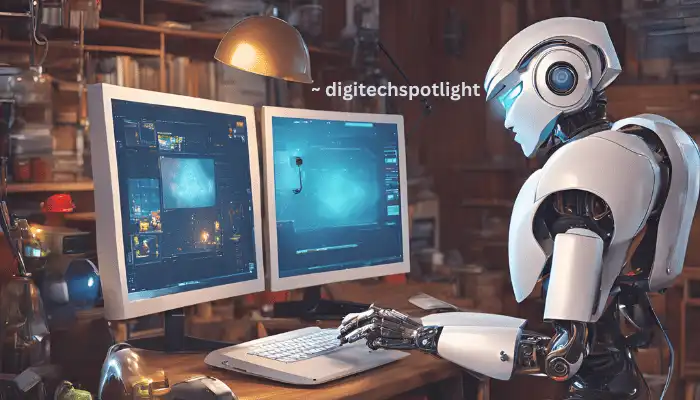Artificial Intelligence (AI) has been quickly changing many industries including gaming, and this industry is not an the exception. As AI tools get more sophisticated it is increasingly utilized to develop concepts and designs to be used in video games. This change has major impacts on human designers as well as artists. This could lead to reductions in jobs as well as changes to how game studios hire employees.
The rise of Generative AI in Gaming
Generative AI (GenAI) instruments like MidJourney and DALL E are currently being utilized by game developers to produce detailed and complicated conceptual art and graphic designs. They can create quality images that are based on texts, which makes these tools a great asset to game developers who want to improve their processes for production and cut expenses.
GenAI learns from huge data sets that allow it to produce images that correspond to particular themes and styles demanded by game creators. The ability to generate professional graphics quickly and efficiently has prompted many studios to implement the tools in their processes.

The loss of jobs and hiring freezes
Based on an investigation conducted of Wired around 10,500 individuals were laid off due in the wake of AI technology used in gaming in 2023. The trend continues into 2024, with approximately 11,000 people affected as of now. Interviews and emails taken by Wired expose an industry in the pressure of cutting costs due to recessionary conditions. In the process, game studios are more relying on AI instruments, which could result in the loss of jobs for graphic makers and designers or creating vacancies that are not filled.
The job losses are part of a larger trend where companies in different industries are embracing AI to boost productivity and cut down on cost. Gaming, due to high demands for high-quality and precise content is finding AI is particularly useful however, it comes at the expense for human jobs.
Wide-spread adoption of AI
An analysis carried out by CVL Economics, which was cited by Wired revealed that gaming companies have given tasks to generative algorithms higher than other industries like film, television or even music. A survey of executives, CEOs and managers found the fact that 90% of video game businesses have implemented Generative AI software. According to the report “The gaming industry is heavily dependent and more than the other industries of entertainment on GenAI for jobs like creating storyboards design concepts for characters, renderings as well as animations.”
This wide-spread adoption is driven by the ability of AI to manage tedious and lengthy tasks which allows human developers to concentrate on more innovative and intricate aspects of game design. The reliance on AI for these jobs is also less need for designers and artists who are human since AI produces similar to, or even better payoff with less effort.
Effect On Major Game Studios
The effect of AI on employment is apparent within major gaming studios. In the event that Microsoft announced the closures and layoffs within their Xbox division in the year 2024, 2D game developers were the worst affected. In May 2024 Microsoft stopped operating Tango Gameworks and Alpha Dog Games. Prior to that, in January 2024 Microsoft laid off 1900 employees of Activision Blizzard and Xbox divisions. The CTO of Activision, Michael Vance, highlighted the possibility of AI technology in an email sent to employees which led to the incorporation of AI for creating conceptual art as well as marketing material and the subsequent reductions.
The layoffs highlighted the conflict between the adoption of new technology as well as the consequent human cost. Although AI improves productivity and lower costs however, it can also eliminate those who traditionally held the positions.
More broader implications beyond gaming
Gaming isn’t the only industry where workers have to contend with pressures from GenAI tools. AI tools such as ChatGPT and MidJourney are advancing significantly as organizations have begun to deploy the tools in a range of different product and service. Businesses use tools such as Claude Sonnet for coding and programming, while these generative AI tools are used in the creative industry to produce text and ideas for art.
Between 2023-2024, about 370,550 workers from more than 1,000 companies in the tech industry were laid off due to recession and the rise in AI, adequate to Layoff.fyi. The companies are cutting their staff to reduce expenses and are increasingly dependent on AI to be able to operate efficiently and effectively and thus improving productivity.
The Economic and Social Impact is broader
The rapid growth of AI within the workplace can be the result of a double-edged sword. One side is that AI offers substantial cost savings as well as efficiency gains. However, it can lead to loss of jobs as well as changes to employment policies. One of the challenges for businesses like gaming to find a balance between technological advancements and the effect on human employees.
Future of AI Gaming: The Future of AI in Gaming
As AI technology advances and boost, its contribution to game development will only increase. AI-based tools will get more advanced and capable of handling more difficult tasks, as well as creating better quality outputs. This may lead to more jobs being lost, however it can also open up possibilities to create new kinds of jobs and positions within the business.
Conclusion
The use of AI technology in the game industry is changing the method in which games are designed. Although this technology can bring huge benefits, regarding cost reductions as well as efficiency, it presents challenges, especially with regard to job loss of human employees. As AI advances in the gaming sector, it is important that others too–have to navigate these developments in a careful manner to keep innovation at bay and the impact on humans.